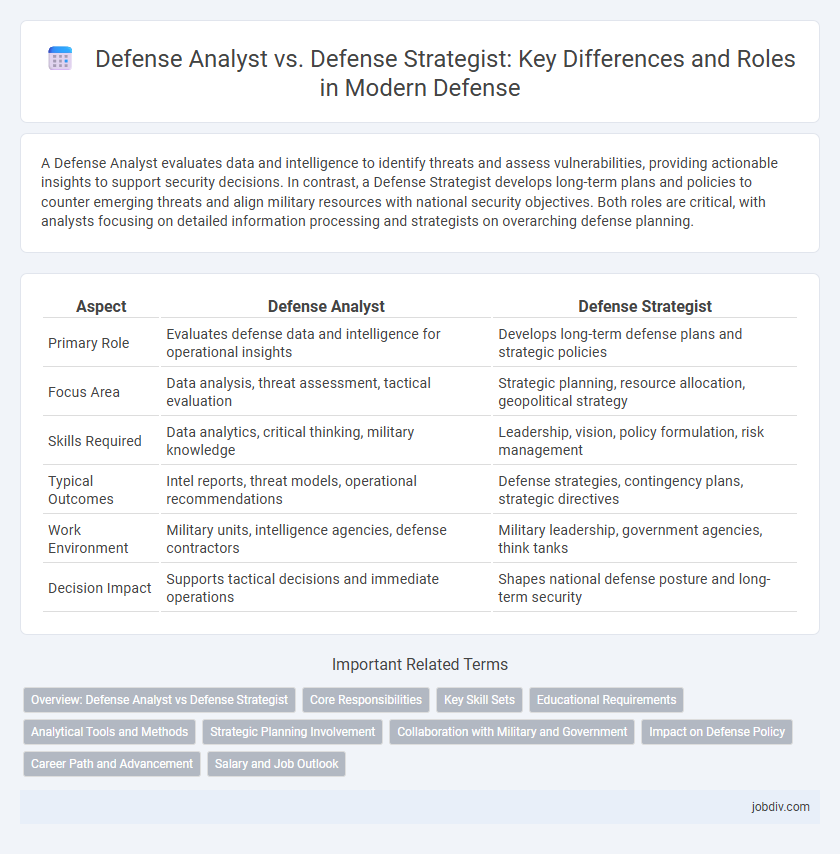A Defense Analyst evaluates data and intelligence to identify threats and assess vulnerabilities, providing actionable insights to support security decisions. In contrast, a Defense Strategist develops long-term plans and policies to counter emerging threats and align military resources with national security objectives. Both roles are critical, with analysts focusing on detailed information processing and strategists on overarching defense planning.
Table of Comparison
| Aspect | Defense Analyst | Defense Strategist |
|---|---|---|
| Primary Role | Evaluates defense data and intelligence for operational insights | Develops long-term defense plans and strategic policies |
| Focus Area | Data analysis, threat assessment, tactical evaluation | Strategic planning, resource allocation, geopolitical strategy |
| Skills Required | Data analytics, critical thinking, military knowledge | Leadership, vision, policy formulation, risk management |
| Typical Outcomes | Intel reports, threat models, operational recommendations | Defense strategies, contingency plans, strategic directives |
| Work Environment | Military units, intelligence agencies, defense contractors | Military leadership, government agencies, think tanks |
| Decision Impact | Supports tactical decisions and immediate operations | Shapes national defense posture and long-term security |
Overview: Defense Analyst vs Defense Strategist
Defense Analysts focus on gathering and interpreting military data, threat assessments, and intelligence to support decision-making, emphasizing tactical and operational insights. Defense Strategists develop long-term national security plans, integrating political, military, and economic factors to guide defense policy and resource allocation. Both roles are critical in shaping effective defense postures, but Analysts provide the empirical foundation while Strategists craft overarching frameworks for strategic defense initiatives.
Core Responsibilities
A Defense Analyst primarily evaluates military data, threat assessments, and security intelligence to provide actionable insights for defense planning and operations. A Defense Strategist focuses on formulating long-term defense policies, strategic objectives, and resource allocation to ensure national security and military effectiveness. Both roles require in-depth knowledge of geopolitical dynamics, defense technologies, and risk management but differ in their scope from tactical analysis to overarching strategic planning.
Key Skill Sets
Defense Analysts excel in data evaluation, threat assessment, and intelligence gathering, utilizing analytical tools to interpret complex security information. Defense Strategists specialize in long-term planning, geopolitical analysis, and developing comprehensive defense policies to safeguard national security interests. Both roles require strong decision-making skills, but Analysts prioritize detailed data synthesis while Strategists focus on broader strategic frameworks.
Educational Requirements
Defense analysts typically require a bachelor's degree in international relations, political science, or defense studies, often supplemented by specialized certifications in intelligence or cybersecurity. Defense strategists usually hold advanced degrees such as a master's or doctorate in strategic studies, military history, or security policy, reflecting the need for in-depth analytical and strategic thinking skills. Both roles value experience in military or defense sectors, but strategists emphasize higher education for leadership in complex defense planning.
Analytical Tools and Methods
Defense Analysts employ advanced analytical tools such as geospatial intelligence software, data mining algorithms, and statistical modeling to evaluate threats and security scenarios. Defense Strategists integrate these analytical results with scenario planning, wargaming methods, and decision-support systems to formulate long-term defense policies and operational plans. The synergy between quantitative data analysis and strategic foresight is critical for informed military decision-making and effective resource allocation.
Strategic Planning Involvement
Defense analysts primarily gather and interpret intelligence data to assess threats and inform military tactics, while defense strategists engage deeply in long-term strategic planning and policy formulation to shape national defense objectives. Strategists synthesize intelligence insights and geopolitical trends to develop comprehensive defense frameworks and contingency plans. Their roles intersect as analysts provide the evidence base that enables strategists to craft effective and adaptive military strategies.
Collaboration with Military and Government
Defense analysts collaborate closely with military units and government agencies to gather intelligence, assess threats, and provide data-driven insights for operational planning. Defense strategists work alongside senior military leaders and policymakers to develop comprehensive defense plans and long-term security policies based on strategic objectives and geopolitical analysis. Both roles require seamless coordination to align tactical assessments with overarching national defense priorities.
Impact on Defense Policy
A Defense Analyst provides critical data-driven insights and threat assessments that directly shape the formulation and adjustment of defense policies. In contrast, a Defense Strategist leverages these analyses to develop long-term strategic plans and frameworks that influence the direction and priorities of national defense initiatives. Their combined efforts ensure defense policies are both evidence-based and strategically aligned with evolving global security challenges.
Career Path and Advancement
Defense analysts specialize in gathering and interpreting military intelligence, focusing on data-driven assessments to support tactical decisions, often advancing through roles in intelligence analysis or specialist consulting. Defense strategists concentrate on long-term military planning and policy formulation, advancing by shaping defense initiatives or assuming leadership in strategic command positions. Career progression for analysts typically involves technical expertise and analytical roles, while strategists move toward high-level policymaking and operational command.
Salary and Job Outlook
Defense analysts typically earn an average salary ranging from $70,000 to $100,000 annually, with demand driven by government agencies and defense contractors analyzing military data and intelligence. Defense strategists, often holding senior roles, command higher salaries between $90,000 and $130,000 due to their expertise in long-term planning and policy development for national security. The job outlook for both positions remains steady, fueled by ongoing global security challenges and increased defense spending.
Defense Analyst vs Defense Strategist Infographic

 jobdiv.com
jobdiv.com